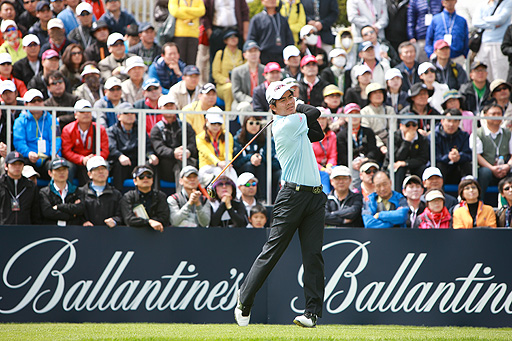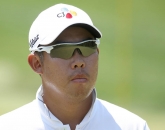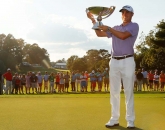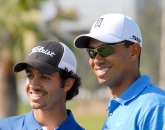When you’ve played with the world’s top-ranked players in European Tour events and majors, what are the main things you notice about their decision making and what have you learnt?
What I’ve seen in these top players is that they all have one thing in common – the long journey they’ve travelled to reach the top. If you look at YE Yang, he went from the Korean Tour to the Japan Tour to the European Tour and the PGA Tour. Look at Graeme McDowell, who did well in Europe and then started to win titles around the world and majors. Everyone follows that journey. You have a trajectory. You need to put in the effort and spend enough time practising in order to get stronger and become a better player. It’s the same with Martin Kaymer; there’s no secret to his success. You have to rely on your practice, as most of the effort is off the course. I also have started to look at myself as I want to summarise and share my experiences with young golfers in the future so they do not have to fall into the same traps I did.
Can you pinpoint a personal moment of good decision making on the course?
Decision making on the course is obviously very important, but equally your homework off the course is very important. You need to know the course very well before the tournament. Your mind needs to be crystal clear about which holes you can attack and which holes you can’t. You need to have your strategy formulated before the round. If I have to focus on a single shot, it was in the Singapore Masters in 2007, which was co-sanctioned by the European and Asian Tours. It was at the last hole and I chose to use a nine-iron to carry 140 yards and it landed close to the hole. [Liang won the event for his first European Tour title].
Which golfer, past or present, personifies good decision making and why?
Ernie Els. First of all, his performances over the years have been very stable. Secondly, his swing is very good, very natural. Thirdly, he’s a very nice person, a gentleman. I’ve never seen him lose his temper, so that’s also very important. Because he’s so consistent and stable in his performances, he must have made many very good decisions. I admire him very much.
How has your ability to make decisions on the golf course helped you in life?
I believe a good decision-making capability on the course is actually derived from your off-course life and your practice. When you have a habit of reviewing your performances, when you can draw upon a lot of experiences, you will be able to make better decisions quicker. The most important aspects are your life and your practice.
However, I believe the influence is actually two-way because when you’re on the course and you want to hit the ball on to the green, you need to know which part or side of the green is safe and which is not safe. Back in life, you also need to be able to frame your choices this way – what you should do, what you should not do.
Which businessmen do you admire for their decisions and choices?
I'd like to cite Li Ka-shing [founder and chairman of Cheung Kong Holdings and chairman of Hutchinson Whampoa Limited], the richest man in Hong Kong, although, I’ve never met him. Behind every successful business, there’s a different recipe for success. However, I believe common threads between success in business and golf is that you need to be focuses and persistent, because nothing is easy. What's important for a successful business or golfer is that you need to be focused on executing every detail well. I also admire his ideas of giving back to the community. Li Ka-shing has not only made a fortune but also created a lot of jobs and offered a lot of opportunities for local communities and families.
Can you talk more about the way you also are giving back?
Firstly, the Liang Wenchong Golf Foundation for Juniors is a natural evolution of the tradition of the Chung Shan Hot Spring Golf Club, because it was the first golf club in China and we want the foundation to continue to grow the club. Secondly, there’s also the responsibility to set a good example for the young golfers. Kids are watching me so it’s important I play well but also set a good example. Through the foundation, we can help more kids learn golf. It would be very expensive for families to pay for their kids to learn golf or to become a member [of a club]. When I began to learn golf, I had the support of Chung Shan Hot Spring. My family could not have afforded the golf coaching, so it’s important for me to give other kids those same opportunities.
I also believe that golf is more than a game. It also has a very proud history and is about culture, and I’m very keen to grow that tradition through this foundation. I’m very proud that I’m able to make this contribution to carry on this golfing tradition in China.
Great Minds Leave Great Impressions
Ballantine's is exploring the role that mental strength plays in golf and the importance of making the right decisions at the right time. A host of the world's best players, including Liang Wen-chong, have been reflecting on how success comes to those with the ability to make these big decisions. For more information visit www.ballantineschampionship.com
Pages
Click here to see the published article.











